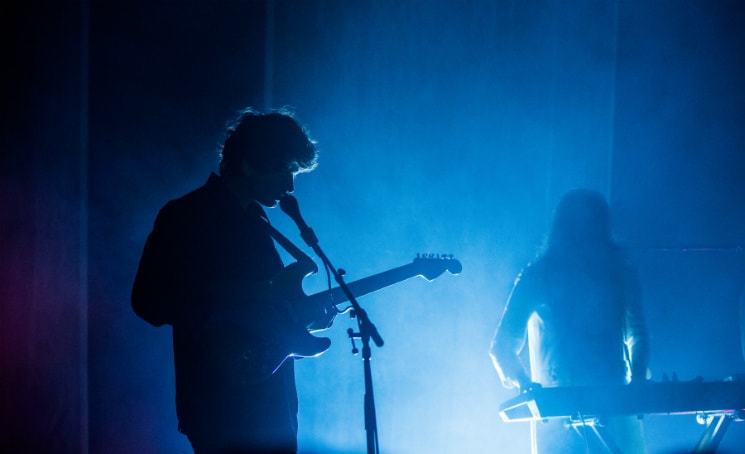Before heading out to last night's Beach House show, the first of two this weekend in Toronto, I made a list in my notebook of words to avoid using in my review— "lush," "ethereal," "hazy" and a myriad of others — that are frequently used to sum up the Baltimore duo's combination of 1990s shoegaze by way of 2000s dream-pop. These are words that aren't inaccurate but do feel, six albums into the band's career (two of which were released last year), somewhat reductive, like the secrets to the band's success comes down to a whole lotta reverb.
When they came out on stage — vocalist/keyboardist Victoria Legrand and guitarist/keyboardist Alex Scally, joined by bassist Skyler Skjelset and drummer Graham Hill — they were backlit by a bright white light, obscuring the band's faces and turning them all into silhouettes. Legrand wore what appeared to be a cross between a dress and a lab coat, all long sleeves and white with her dark hair long and loose, while the men all wore black. Add a fog machine, and the effect was something like four ghostly figures appearing in the mist.
Because while Beach House are often described in terms befitting for the soundtrack to whimsical indie movie, they're perhaps best suited to score a horror film. Melodies that are already filled with sharp accidental notes verge on the creepily atonal when performed live, and the Beach House repertoire is filled with them. The A-sharps in "Walk In The Park" seemed especially harsh during their performance, which did their job from keeping the song from venturing into safe and pretty territory.
When Legrand's vocals aren't being mixed into a recording, she has the opportunity to howl in the most unexpected places; "Somewhere Tonight," which typically sounds like a 1950s love ballad with an Instagram filter thrown on, turned into an unsettling plea when her voice was let loose. Scally, for his most part, was a steady presence behind Legrand, though occasionally venturing forth on songs punctuated by guitar, like Depression Cherry's elegiac "Beyond Love." The backlight onstage, meanwhile, switched from white to a blood red to a vibrant green, shades befitting an old Dario Argento movie, before erupting into a panoply of twinkling stars.
In between songs, Legrand paused the set to alert staff that somebody needed medical help in the crowd. The lights went on and the audience started to murmur.
"Everybody relax," said Legrand, addressing the crowd. "Does my voice relax you or does it cause you to feel fear?" The answer, as the rest of the set went on to prove, was that the two aren't mutually exclusive.
When they came out on stage — vocalist/keyboardist Victoria Legrand and guitarist/keyboardist Alex Scally, joined by bassist Skyler Skjelset and drummer Graham Hill — they were backlit by a bright white light, obscuring the band's faces and turning them all into silhouettes. Legrand wore what appeared to be a cross between a dress and a lab coat, all long sleeves and white with her dark hair long and loose, while the men all wore black. Add a fog machine, and the effect was something like four ghostly figures appearing in the mist.
Because while Beach House are often described in terms befitting for the soundtrack to whimsical indie movie, they're perhaps best suited to score a horror film. Melodies that are already filled with sharp accidental notes verge on the creepily atonal when performed live, and the Beach House repertoire is filled with them. The A-sharps in "Walk In The Park" seemed especially harsh during their performance, which did their job from keeping the song from venturing into safe and pretty territory.
When Legrand's vocals aren't being mixed into a recording, she has the opportunity to howl in the most unexpected places; "Somewhere Tonight," which typically sounds like a 1950s love ballad with an Instagram filter thrown on, turned into an unsettling plea when her voice was let loose. Scally, for his most part, was a steady presence behind Legrand, though occasionally venturing forth on songs punctuated by guitar, like Depression Cherry's elegiac "Beyond Love." The backlight onstage, meanwhile, switched from white to a blood red to a vibrant green, shades befitting an old Dario Argento movie, before erupting into a panoply of twinkling stars.
In between songs, Legrand paused the set to alert staff that somebody needed medical help in the crowd. The lights went on and the audience started to murmur.
"Everybody relax," said Legrand, addressing the crowd. "Does my voice relax you or does it cause you to feel fear?" The answer, as the rest of the set went on to prove, was that the two aren't mutually exclusive.
